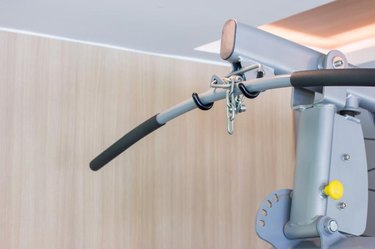
When it's time to work your biceps, you head right for the free weights to do curls. You may change the rhythm, grip or use dumbbells instead of a barbell, but for the most part, the exercise remains the same.
Think out of this box when working your biceps. An underhand, narrow grip during the lat pulldown can work the biceps as effectively as a curl.
Video of the Day
Video of the Day
The Research
A study in a 2015 issue of the Asian Journal of Sports Medicine tested the effects of biceps curls and lat pulldowns on 29 young men with no resistance training experience. Approximately half of the group performed lat pulldowns to train the biceps while the other 15 performed classic biceps curls. After 10 weeks of training twice per week, both groups experienced similar gains in muscle strength and size.
Even if you don't reverse your grip (hold the bar underhand, rather than overhand), a lat pulldown with a medium or narrow grip activates the biceps more than a wide grip as confirmed by research in a 2014 issue of the Journal of Strength and Conditioning Research.
Read More: Muscles Used in a Lat Pulldown Machine

How to Do a Lat Pulldown to Target the Biceps
Use a cable machine with a lat pulldown attachment if you can. This way you can switch the long lat pulldown bar to a short straight bar. If you're unable to change the bar, use the long bar, but keep the grip narrow.
- Hold the bar with an underhand grip and hands placed about shoulder-distance apart.
- Sit and lock your knees under the pads. Pull the bar down to your chest by bending your elbows. Pause momentarily.
- Straighten your elbows to complete one rep.

When to Use the Move
If you're serious about training your biceps, use the narrow, reverse-grip lat pulldown as a finishing exercise in your biceps workout. After you've done three or four other exercises for your biceps, such as preacher curls, hammer curls and cable curls, hit one or two sets of eight to 10 reps of the lat pulldown. Your biceps will be fatigued and will appreciate the help your mid-back provides during the exercise.
It's important to remember that a lat pulldown trains your biceps and back when you plan your weekly split workouts. Many lifters train a different body part on certain days of the week. This spreads long lifting sessions out and helps you focus more precisely on each muscle. But, when planning splits, you want to be sure to leave 48 hours between workouts for specific muscles.
It's helpful to work biceps and back on the same day as many back exercises — not just the lat pulldown — use the biceps for assistance. If you want to work just one muscle group per day and give your biceps a true 48 hours after a tough session, don't work them the day before or after you work your back. For example, a solid routine could have you working arms (biceps and triceps) on Monday, legs on Tuesday, back on Wednesday and abs on Thursday.